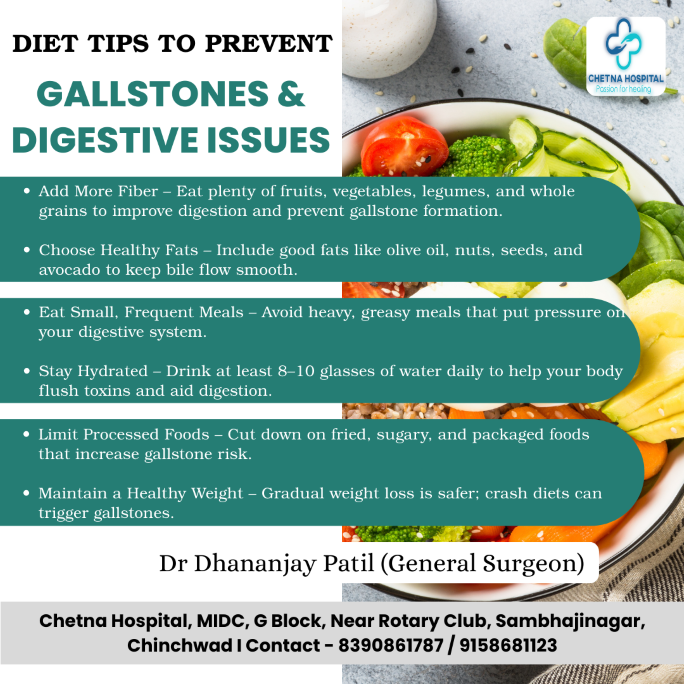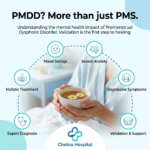Good digestion is the foundation of good health. When our digestive system works well, the body absorbs nutrients efficiently, keeps our energy levels steady, and prevents unnecessary discomfort. However, poor eating habits, unhealthy lifestyles, and certain risk factors can lead to issues like gallstones, indigestion, bloating, constipation, and even more serious gastrointestinal conditions.
Gallstones, in particular, are a common problem that can silently develop in the gallbladder — the small organ beneath the liver responsible for storing bile. Bile helps break down fats during digestion, but when its chemical balance is disturbed, it can form stones that cause severe pain and complications.
Fortunately, what you eat plays a big role in keeping your gallbladder and digestive system healthy. By following some simple, consistent diet tips, you can significantly reduce your risk of gallstones and improve digestion.
Understanding Gallstones and Digestive Problems
Gallstones are hardened deposits of digestive fluid (bile) that can vary in size — from a grain of sand to a golf ball. Some people develop just one gallstone, while others may have several at the same time. In many cases, gallstones don’t cause symptoms, but when they block the bile ducts, they can trigger:
- Severe abdominal pain (often on the right side or under the ribs)
- Nausea and vomiting
- Indigestion or bloating after fatty meals
- Fever and jaundice (in severe cases)
Digestive issues, on the other hand, can range from mild symptoms like gas and constipation to chronic conditions like gastritis, irritable bowel syndrome (IBS), and acid reflux. Poor diet, dehydration, and irregular eating habits are among the top causes.
The good news is that a healthy diet is both preventive and therapeutic for most digestive problems, including gallstones.
Diet Tips to Prevent Gallstones & Improve Digestion
1. Increase Fiber Intake
Fiber is essential for healthy digestion. It keeps bowel movements regular, reduces cholesterol levels, and helps maintain a healthy weight — all factors that lower the risk of gallstones.
Best sources of fiber:
- Fresh fruits: apples, pears, berries, oranges
- Vegetables: broccoli, spinach, carrots, beets
- Legumes: lentils, beans, chickpeas
- Whole grains: oats, brown rice, whole wheat bread
Tip: Aim for at least 25–30 grams of fiber per day. Add vegetables to every meal and choose whole grain options instead of refined products.
2. Choose Healthy Fats
Your body needs some fat to absorb vitamins and produce hormones, but the type of fat you eat matters. Healthy fats promote bile flow, which prevents gallstone formation.
Healthy fat options:
- Olive oil
- Nuts and seeds
- Avocados
- Fatty fish like salmon and mackerel
Avoid:
- Deep-fried foods
- Trans fats (found in processed snacks and margarine)
- Excess butter or cream
3. Eat Small, Frequent Meals
Large, heavy meals can overload your digestive system and strain your gallbladder. Eating smaller, balanced meals throughout the day helps regulate bile release and reduces the risk of digestive discomfort.
Practical tips:
- Don’t skip breakfast — it jumpstarts digestion.
- Avoid long gaps between meals.
- Stop eating before you feel overly full.
4. Stay Hydrated
Water is essential for nearly every process in the body, including digestion and bile production. Dehydration can make bile thick, increasing the risk of gallstones.
Hydration tips:
- Drink at least 8–10 glasses of water daily.
- Limit sugary drinks and excessive caffeine.
- Include hydrating foods like watermelon, cucumber, and oranges.
5. Limit Processed & Sugary Foods
Diets high in refined carbohydrates and sugar are linked to gallstone formation and poor digestive health. Processed foods often contain unhealthy fats, additives, and preservatives that irritate the digestive tract.
Foods to limit:
- Sugary snacks and desserts
- White bread, pasta, and pastries
- Packaged chips and instant noodles
- Soft drinks and sweetened beverages
6. Maintain a Healthy Weight
Being overweight increases cholesterol levels in bile, making gallstone formation more likely. However, rapid weight loss can also trigger gallstones.
Healthy weight tips:
- Focus on gradual weight loss (0.5–1 kg per week).
- Combine a balanced diet with regular exercise.
- Avoid crash diets or skipping meals.
7. Include Lean Protein
Protein is important for tissue repair and muscle strength, but fatty meats can overload your digestive system. Choose lean protein sources for better digestion and gallbladder health.
Best options:
- Skinless chicken or turkey
- Fish
- Tofu and soy products
- Legumes and lentils
8. Avoid Excessive Alcohol
While moderate alcohol consumption may not be harmful, excessive drinking irritates the digestive system and increases the risk of liver and gallbladder problems.
Tip: If you drink, keep it within recommended limits — ideally no more than one drink per day for women and two for men.
Lifestyle Tips Alongside Diet
While diet is crucial, your lifestyle choices also affect digestive and gallbladder health:
- Exercise regularly – Physical activity helps maintain a healthy weight and stimulates bowel movement.
- Manage stress – Chronic stress can trigger digestive symptoms like bloating and cramps.
- Get enough sleep – Poor sleep affects digestion and metabolism.
- Avoid smoking – Smoking is linked to several digestive disorders.
When to See a Doctor
If you experience persistent digestive discomfort or symptoms like:
- Severe abdominal pain
- Yellowing of the skin or eyes (jaundice)
- Fever with abdominal pain
- Frequent indigestion after fatty meals
…you should consult a doctor immediately. Gallstones can sometimes cause life-threatening complications if left untreated.
Final Thoughts
Your gallbladder and digestive system are more sensitive to diet than you might think. The foods you eat can either promote smooth digestion and healthy bile flow or trigger discomfort and disease. By eating more fiber, choosing healthy fats, staying hydrated, limiting processed foods, and maintaining a healthy weight, you can significantly reduce your risk of gallstones and other digestive issues.
These changes don’t have to happen overnight. Start with small steps — swap refined grains for whole grains, add an extra serving of vegetables to dinner, replace fried snacks with nuts, and carry a water bottle to stay hydrated. Over time, these habits will become second nature, protecting your digestive health for years to come.













